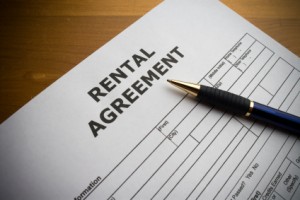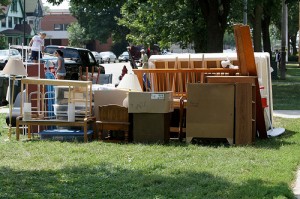Posted by Teresa on January 27, 2012 under Eviction, Tenant Screening & Background Checks | 
 Landlords, have you ever been the victim of a scam pulled off by a “professional tenant?” There are always a few lurking around in the shadows. We’ve heard a few stories lately about landlords who have suffered losses because they unknowingly fell victim to a pro.
Landlords, have you ever been the victim of a scam pulled off by a “professional tenant?” There are always a few lurking around in the shadows. We’ve heard a few stories lately about landlords who have suffered losses because they unknowingly fell victim to a pro.
Jeff is a new landlord who recently arranged with a couple to lease a rental unit he owns. They wrote a check for the first month’s rent and security deposit, which Jeff deposited into his account. A week later, they cancelled the lease because their employer was transferring them out of state. They asked for a refund. Jeff refunded the full amount, only to discover the original check was written on a non-existent account. It was counterfeit. The couple flew the coop and Jeff is out nearly $1300.
Banks don’t typically place holds on every check, so Jeff assumed it had cleared the bank with no problem.
One way to avoid this scam: Ask for the first month’s rent and security deposit in cash. That would have sent these two packing.
A better solution: Run a thorough tenant screening on every applicant. Check their credit history and criminal history. Call previous landlords and their current employer. Remember: scammers do their best work when no questions are asked.
Another story is about a famous scam where the tenant moves into an apartment and proceeds to trash the place. Or he just stops paying rent. He then waits for the eviction notice or sues the landlord for unsafe housing. He’s an expert at stretching out the judicial process though filing complaints, asking for judge recusals and causing postponements. In the meantime, landlords are racking up massive attorney’s fees, he’s living rent-free for months or years, and usually the court decides in his favor.
The only way to avoid this type of tenant scam is through tenant screening. One of the victims of this scammer admitted she didn’t check with any of his previous landlords before renting him an apartment.
Protect yourself, your business and your wallet by keeping your guard up, trusting no one you don’t know, and running a tenant background check on every prospective tenant.
Posted by Teresa on January 20, 2012 under Eviction, Landlord Tips | 
 Just because you don’t allow subleasing in your rental units doesn’t mean your tenants won’t do it—for a number of reasons. Perhaps they landed a new job in another city, or want to move in with a significant other, or maybe the apartment of their dreams became available. Tenants sometimes want to move before the lease is up; and rather than breaking the lease, finding someone to move in and take it over is a better option. For them.
Just because you don’t allow subleasing in your rental units doesn’t mean your tenants won’t do it—for a number of reasons. Perhaps they landed a new job in another city, or want to move in with a significant other, or maybe the apartment of their dreams became available. Tenants sometimes want to move before the lease is up; and rather than breaking the lease, finding someone to move in and take it over is a better option. For them.
When your tenants sublease without your knowledge, they have prevented you from conducting your usual due diligence on the people who are living on your property. You don’t know if they have a good rental or credit history. You have no way of knowing if they will take care of your property or be good neighbors. You don’t even know if they have jobs.
How do landlords find out about sublessors? Sometimes, the rent checks keep coming in from your tenant, because the sublease tenant is paying him or her. In other cases, the tenant will have the sublessor send their own checks directly to you. If you accept online payments, your tenant can simply give the sublessor the login and password, and they can pay out of their own account. Depending on the e-pay service, you may or may not have access to the name on the account.
When faced with an unauthorized sublease situation, the landlord holds all the cards. If your lease clearly states “no subleasing,” then you have recourse and can likely start eviction proceedings against the original tenant. And in most sublease agreements, the sublessor only has rights to occupy as long as the original tenant does.
Check with your attorney for all the details, but in most cases, landlords are never under any obligation to accept a sublessor if the lease prohibits it.
Posted by Teresa on January 16, 2012 under Landlord Tips, Rental Market | 
 The rental market has been very good over the past year or so, and economists say that’s expected to continue—at least for the near future. But economists also predict more renters becoming homebuyers later in 2012, as employment increases and the housing market finally starts inching its way back from the seemingly bottomless pit it’s been in.
The rental market has been very good over the past year or so, and economists say that’s expected to continue—at least for the near future. But economists also predict more renters becoming homebuyers later in 2012, as employment increases and the housing market finally starts inching its way back from the seemingly bottomless pit it’s been in.
If you haven’t raised your rents during this landlord’s market, you may be thinking about doing so, before the pendulum swings back to the tenant’s favor. Here are some simple steps that can put more money in your pocket and keep good tenants from moving:
- Study your market rents. There are a number of online tools you can use to check comparable rents in your area. You need to know whether your rents are in line with, above or below market. Obviously, if your rents are above market, you should rethink the plan to raise them any further.
- Review your expenses. Have the costs of maintenance, insurance and other business-related expenses gone up? Take this into consideration when setting your new rents.
- Determine which tenants you really want to keep, and which you think you could replace with better quality tenants. You may choose to lower the amount of the rent increase for great tenants that you’d like to stick around.
- Examine your lease records to determine which will be up for renewal in the next 12 months. What does your lease or state law say about rent increases? Do you need to give a tenant 30, 60 or 90 days’ notice if raising the rent at lease renewal? 30 days is usually not enough for a tenant to make a decision to move and let you know they will not be renewing. The longer notice you give, the better your relationship with your tenants will be.
- Formulate a plan. Decide how much of an increase is fair, based on market rents and the tenant’s history with you. If you really want to keep a good tenant, think about a smaller increase. You can also be ready to offer a longer lease at the new rate—18 months, for example—so the tenant can be assured that the rent will remain stable for a longer period of time. Have your market data ready to show tenants, so they know they’re still getting a good deal.
- Prepare a well-written notice. Be sure to thank your tenants for their business and for being good tenants. Let them know the amount of the rent increase and the process for lease renewal. Soften the blow by letting them know that your expenses have increased, that you’ve studied the local market and are keeping rents within the average range. Typically, if the tenant does nothing, the lease renews at the new rate. If tenants give notice, let them go and replace them with new tenants who will pay the new rent.
Of course, keeping a good tenant is always better than the expense and trouble associated with finding a new, qualified tenant. Keep this in mind when determining the amount of your rent increase. Follow these steps and you can be on your way to painless rent raising!
Protect your rental property and assets through tenant background checks. Proper tenant screening will ensure you are leasing to the best possible tenants.
Posted by Teresa on January 9, 2012 under Eviction | 
 The last thing most landlords and tenants want to face is an eviction. For landlords, it’s messy, time-consuming and can be costly. For tenants, eviction can hurt their chances of renting another home, and could even leave them homeless.
The last thing most landlords and tenants want to face is an eviction. For landlords, it’s messy, time-consuming and can be costly. For tenants, eviction can hurt their chances of renting another home, and could even leave them homeless.
There are ways to prevent a landlord-tenant relationship from ending in eviction, including proper tenant screening and conducting thorough tenant credit checks. But even good tenants lose jobs or have unexpected medical bills that can lead to difficulty paying rent. And when they stop paying rent, and won’t move on their own, eviction is the landlord’s legal recourse.
Depending on the state you live in, landlords are typically required to follow a strict protocol and process of notifying a tenant of impending eviction. Whether or not the tenant decides to fight the notice will determine whether the process goes quickly or drags out. The latter will add time and legal fees to the landlord’s case.
Other legal fees a landlord typically encounters in an eviction case include unlawful detainer for each adult in the rental unit, judgment, garnishment and service fees.
If you win your case, you then must remove the tenant from the property. In most states, you cannot just throw a tenant’s belongings out on the sidewalk. Typically, local law enforcement serves a notice and gives the tenant several days to leave. If they don’t, they will be removed by law enforcement.
In a few states, landlords are allowed to dispose of property a tenant leaves behind, but in most places, you’ll need to store the tenant’s property and follow proper notification procedures. In New York and New Jersey, for example, a landlord must store an evicted tenant’s belongings for 30 days, resulting in additional costs that are rarely recovered.
Expenses for cleaning and repairs add to the losses experienced by the landlord, since any security deposit paid by the tenant has likely been offset by loss of rent and legal fees.
By properly pre-screening tenants, offering an iron-clad lease to qualified applicants, and requiring strict adherence to rent due dates, landlords can establish a business model that lessens the chances of eviction—and saves them significant money and time.
Posted by Teresa on January 6, 2012 under Landlord Tips | 
 The declining housing market created plenty of new landlords, some of whom may have never planned on owning rental property. Some are leasing a house they couldn’t sell, while others are taking advantage of low prices and investing in properties to rent. Still others are renting out floors or rooms in their own homes.
The declining housing market created plenty of new landlords, some of whom may have never planned on owning rental property. Some are leasing a house they couldn’t sell, while others are taking advantage of low prices and investing in properties to rent. Still others are renting out floors or rooms in their own homes.
One thing all landlords need is proper liability insurance coverage on their rental properties:
- If you’re renting a room or section of your own home, you will probably be okay with your existing homeowner’s insurance coverage.
- If you don’t live in the same house with your tenants, you’ll likely need a separate policy.
Why Do You Need Landlord Liability Insurance?
Imagine losing your savings over a lawsuit brought by a tenant because of an injury suffered on your property. Or if a neighbor’s child is bitten by your tenant’s dog on the sidewalk in front of your property. Even a visitor to your tenant’s unit could possible sue if he or she is injured on your property through no fault of yours.
Will your retirement fund be wiped out? What about your kids’ college funds? Could you lose your home, as well as your rental property? All of these assets could be at risk when you begin renting out a property you own without proper liability insurance.
Check with your insurance provider about your options. They may include:
- Basic coverage, for fire and vandalism.
- The next level of coverage will typically include acts of nature, such as windstorms.
- The top tier, an “open peril” policy, covers all perils, except those specifically named.
Some insurance companies offer special landlord insurance packages, which typically cover damages to your building and outbuildings, as well as your personal property stored on site. Some offer loss-of-rental-income and legal defense and court cost coverage.
If you’re a new landlord who hasn’t yet looked into insurance, your next call should be to your insurance agent!
Legal disclaimer:
The contents of this article are intended for general information purposes only, and should not be relied upon as a substitute for obtaining legal advice applicable to your situation.
Posted by Teresa on January 5, 2012 under Rental Market | 
 For landlords in most markets, 2011 was a good year, with low vacancy rates and higher rents than previous years. What can landlords expect to see in 2012?
For landlords in most markets, 2011 was a good year, with low vacancy rates and higher rents than previous years. What can landlords expect to see in 2012?
Strong growth in rental demand. Forecasters say demand will continue to grow for rental housing, based on a continued weak job market. Employment is expected to improve at a slow rate, which could increase demand as more people move out of shared housing situations.
A continued soft housing market. Losing renters to home purchases will probably not be a big issue for rental property owners. In some areas, such as Texas, home sales started increasing in the last half of 2011. Wherever employment growth occurs, demand for rentals will continue, and some home sale increases are expected.
Lower than normal supplies of multi-family housing. While construction permits are increasing and new development is starting to happen, most big construction projects are still in the planning phase. In most areas, new supply levels won’t be much higher in 2012. Exceptions are Washington DC, Dallas, Tex. and Orange County, Calif.
Higher occupancy rates. The economy will continue to produce renters for low- and mid-tier properties. High-end properties are still in high demand, but as wages stagnate, more renters will be pushed into lower rents, driving those occupancy rates higher.
Rent growth of 4% to 4.5%. Property owners who continue to increase rents could see higher turnover; others will likely see value in keeping existing tenants.
Top Ten Rental Markets for 2012
- San Francisco will continue to lead the nation in apartment rental growth, followed by:
- Austin, Tex.
- San Jose, Calif.
- Oakland, Calif.
- Boston, Mass
- New York City
- Denver, Colo.
- Dallas, Tex.
- Charlotte, North Carolina
- Houston, Tex.
Protect your rental property and assets through tenant background checks. Proper tenant screening will ensure you are leasing to the best possible tenants.
 Landlords, have you ever been the victim of a scam pulled off by a “professional tenant?” There are always a few lurking around in the shadows. We’ve heard a few stories lately about landlords who have suffered losses because they unknowingly fell victim to a pro.
Landlords, have you ever been the victim of a scam pulled off by a “professional tenant?” There are always a few lurking around in the shadows. We’ve heard a few stories lately about landlords who have suffered losses because they unknowingly fell victim to a pro.




